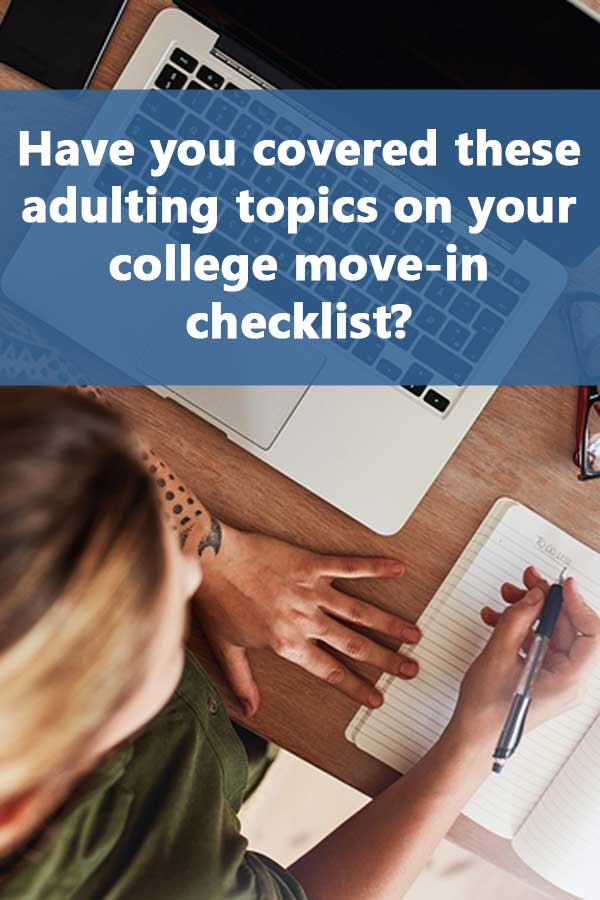 As parents swing between the excitement of going through the latest dorm checklist from Target or cry in their morning coffee cup while making hotel reservations for the college move in date, they shouldn’t overlook the most important checklist, the adulting checklist. The reality is that heading off to college also marks the transition to adulthood. While many see college as a sort of intermediate step to becoming a full adult, as far as the law is concerned, your 18 year old is an adult. So take the time to go over the following adulting topics and make sure you have them covered by move-in day.
As parents swing between the excitement of going through the latest dorm checklist from Target or cry in their morning coffee cup while making hotel reservations for the college move in date, they shouldn’t overlook the most important checklist, the adulting checklist. The reality is that heading off to college also marks the transition to adulthood. While many see college as a sort of intermediate step to becoming a full adult, as far as the law is concerned, your 18 year old is an adult. So take the time to go over the following adulting topics and make sure you have them covered by move-in day.
Legal Stuff
It’s not surprising that many families are unprepared for the legal implications of their college students being 18. After all, as far as the government and colleges are concerned, parents are still responsible for paying the college bills (and can choose to pay their health insurance) so why wouldn’t they also expect to have access to their off-springs’ college and health records?
Join other parents in the Coffee Cup College Planning Facebook Group
Actually, that’s more of a philosophical question whose answer isn’t going to change the laws between now and September, so let’s focus on the current reality. The following are links to articles on legal issues/documents families should know about before anyone is dropped off at college.
Health Insurance Portability and Accountability Act (HIPAA)
“Once a child turns 18, the child is legally a stranger to you”
If you read just one article, I suggest Will You Be Able to Help Your College-Age Child in a Medical Emergency? This Consumer Reports article by Susan Feinstein starts with a real life warning of what can happen if parents don’t have HIPAA authorization, medical power of attorney, and durable power of attorney. This is a short, easy read and should not be avoided just because the college never mentions it. As Feinstein observes of her warning story, “The irony of her story is that Warsh is an attorney specializing in the practice of trusts and estates as a partner at a Chicago law firm.”
Another good article to read is Don’t send your child to college without this by John Wasik on MoneyWatch. This covers the same information as the Consumer Reports article but mentions the need to have some tough conversations with your teen about end-of-life issues. Wasik writes that, “The good news is that you can obtain these documents for free and sign them any time — you don’t need to pay a lawyer to execute them” and includes links to free downloads.
Family Educational Rights and Privacy Act of 1974 (FERPA)
This is an especially murky area of law where colleges have a lot of leeway in how they interpret the various rules. Read what What You Need to Understand Your Educational Privacy Rights by Willard Dix for a good overview of the situation. Despite what some colleges say, they can reveal certain information to parents without the student’s consent. Dix suggests that “For parents and students concerned about possible situations once the student is enrolled in college, a discussion with the college’s compliance officer might be a part of doing college research.”
Adulting Life Skills (Calling mom is not the appropriate answer)
The following are articles that cover the various life skills necessary for successful “adulting.” The problem is that too often, many well-meaning parents are still doing many of these activities for their teens even as they prepare to leave for college. I can’t help but wonder if this is part of the reason why some parents don’t want their kids to go too far away for college–they don’t think they have to ability to cope completely by themselves.
These adulting issues have been getting a lot more attention since Julia Lythcott-Haims wrote How to Raise an Adult: Break Free of the Overparenting Trap and Prepare Your Kid for Success. In fact, of the four articles I have, two are based on her book so, you may just decide to get the book. But if you want to find out if you’ve been more diligent in your parenting than those encountered by Lythcott-Haims and don’t need to book, read on.
The The 8 Life Skills All 18-Year-Olds Should Have: A Checklist For Parents is one of the two Lythcott-Haims based articles. Each of the skills is organized with a description of the problem and advice on how to avoid it from becoming a problem. Not sure they’re all something you can accomplish the summer before starting college.
12 Basic Life Skills Every Kid Should Know by High School by Ellen Sturm Niz covers some of the same material as the above article. However, the specificity of some of the skills, do laundry and pump gas, provide something concrete that can be taught in three months or less.
10 Things College Freshmen Should Know How To Do Before They Step Foot On Campus, Because You’re Basically Adults by Emily Kelley is worth the read because it also covers college specific realities. It includes registering for class and the importance of professors. It’s a combination of skills to learn and advice to heed and should be shared with your teen.
This list by Helene Wingens, “Here Are the 33 Life Skills Your Kid Needs to Know to “Adult,” is the most comprehensive of the adulting checklists. I like that it includes finding their polling place, how to fill a prescription, and what to do if their stomach is upset. It is definitely oriented as something the make sure you kid has learned by the end of summer.
More Resources on Adulting Topics
Why Teen Checking Accounts Should be Part of Your College Prep
Take These Three Steps When Your Child Turns 18
Essential Documents Your Young Adult Children Should Sign
If Your Kid Is 18, You Need These Documents
CONNECT WITH OTHER PARENTS PLANNING FOR COLLEGE
JOIN THE COFFEE CUP COLLEGE PLANNING FACEBOOK GROUP


